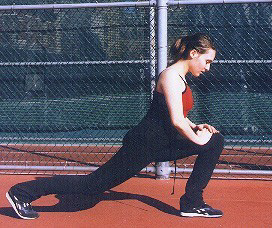Playing
Like a Girl
by Sasha Stumacher
Produced for the Web by Alexandra Chughtai-Harvey

Courtesy of
Stacey Kramer |
A
woman athlete often finds herself in the double bind of maintaining
traditional standards of femininity while her sport demands
that she overcome them.
Aggressive,
powerful, confident, strong; these athletic qualities are
sometimes hard to reconcile with softness and submissiveness.
Though most female athletes manage to achieve a balance,
for some, the toll on their emotional well- being can be
devastating.
| "From
a very early age in our culture, females are taught
to think that their acceptability, their self-worth
depends on how they look." |
"There's
No Crying in Baseball"
"From a very early age in our culture, females
are taught to think that their acceptability, their self-worth
depends on how they look," says Dr. David Schlundt,
a psychology professor at Vanderbilt University. "Boys
are taught very differently, that your self-worth depends
more upon what it is you can do; your accomplishments, your
success, your competitiveness."
For
women, says Dr. Salvator Cullari, psychology professor at
Lebanon Valley College, the message is, "they should
be both physically attractive and good in sports. Just look
at the female soccer star of last year who was more famous
for taking off her shirt than for her goal," he said,
referring to Brandi Chastain's World Cup victory strip.
A dancer
turned rugby player, who asked not to be identified, said
one of the greatest pressures she feels as she trains for
her sport is to maintain her femininity. "If a male
athlete is built and very obviously muscular, there are
no questions asked," she said. "But if you see
a very athletic looking girl, a lot oftimes questions and
objections are raised."
"Personally," she added, "I always have pink
fingernails and toes. Have you seen the Nike commercial
that says 'I wear dresses, I wear muscles?' That's how I
try to present myself."
Dr. Michael
Sachs, a professor of kinesiology at Temple University,
argues that feminine stereotypes are so ingrained in the
behavior of female athletes that these gender norms -- less
aggressive, more emotional, more sensitive, more cooperative
and collaborative -- become part of the way women play.
Dr. Kevin
Burke, a sports psychologist at Georgia Southern University,
adds that some female athletes are adept at separating their
femininity from their athleticism; women who think, "I'm
female, but when I walk out onto the basketball court, I'm
an athlete."
NEXT:
Careful Coaching>>
|

